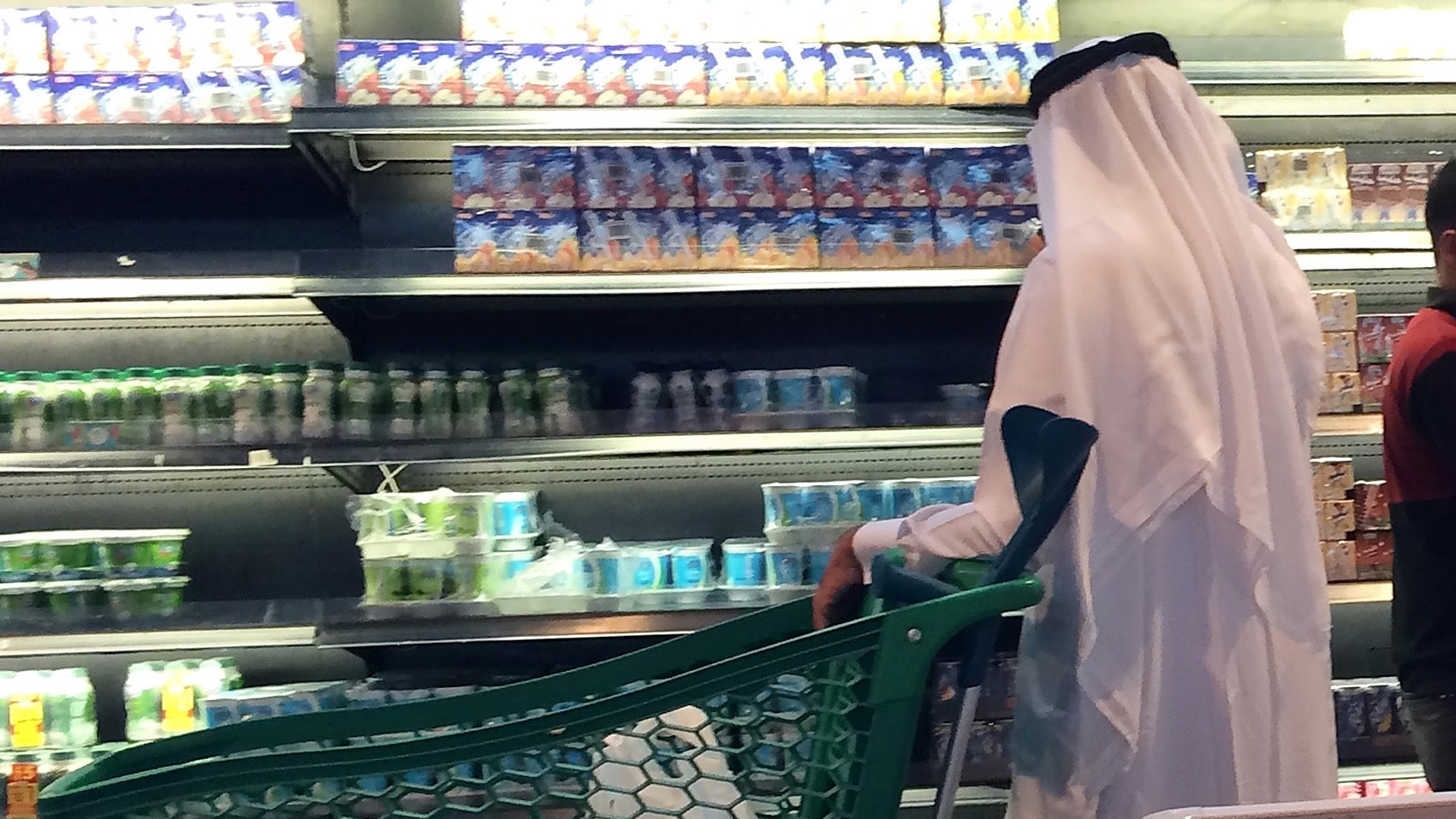As Qatar’s Emir Sheikh Tamim bin Hamad Al-Thani held talks with leaders in Turkey, France, and Germany in his first foreign tour amid the ongoing diplomatic crisis with Saudi Arabia, one of the foremost things on his mind probably was ensuring food security for the small Gulf state.
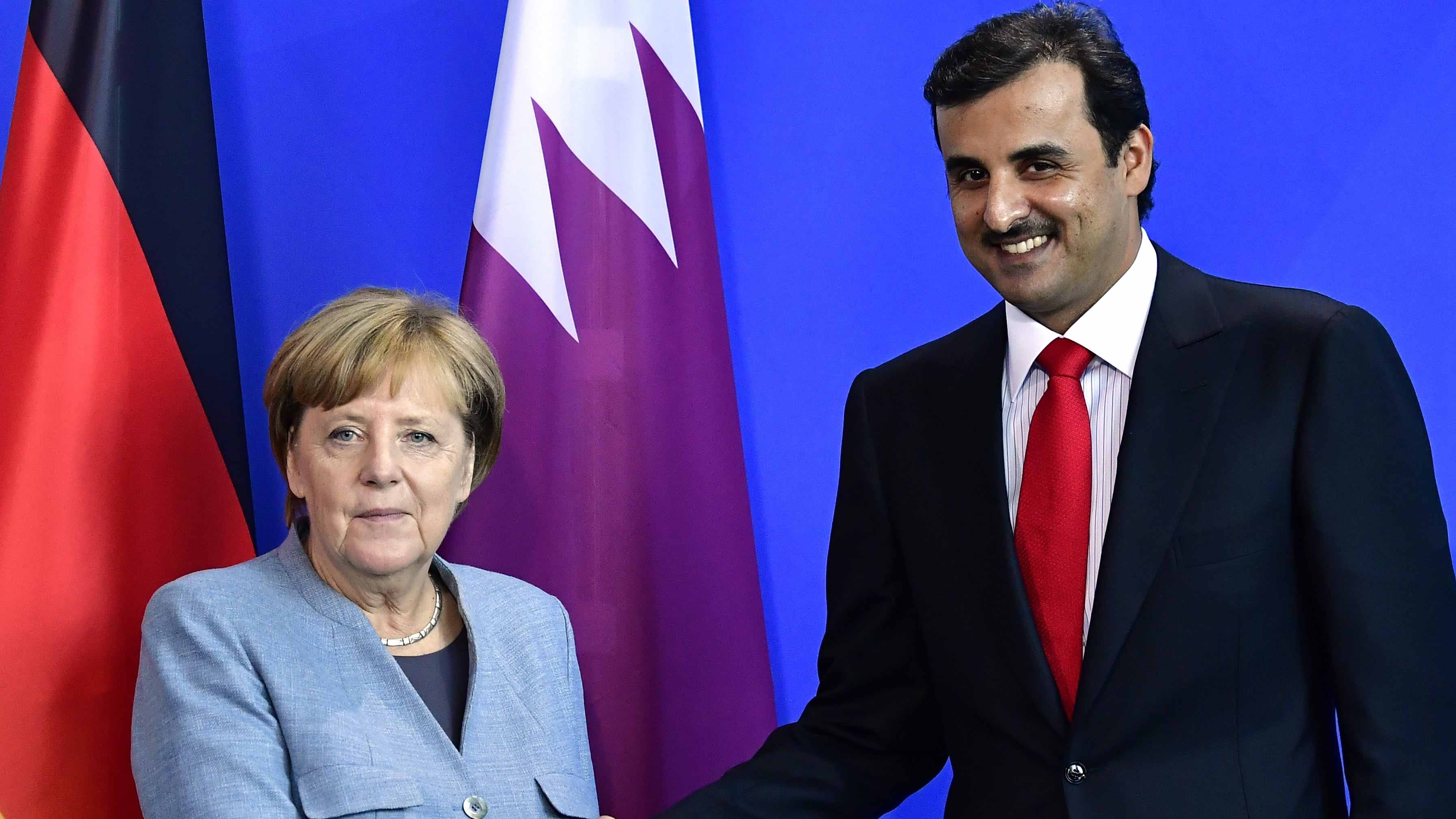
German Chancellor Angela Merkel shakes hands with Qatar's Emir Sheikh Tamim bin Hamad Al-Thani after talks at the Chancellery, in Berlin, on September 15, 2017. /AFP Photo
German Chancellor Angela Merkel shakes hands with Qatar's Emir Sheikh Tamim bin Hamad Al-Thani after talks at the Chancellery, in Berlin, on September 15, 2017. /AFP Photo
According to a recently published study, Doha could be staring at a huge food and commodity shortages which may lead to civil unrest and even a potential coup or foreign intervention in the Gulf nation.
The paper, presented at the ”Qatar: Global Security & Stability” conference organized by Qatar’s political opposition in London on Thursday, also predicted that the Gulf diplomatic crisis, which involves a Saudi-led embargo on Qatar, is expected to stretch into 2018.
In June, Saudi Arabia, the United Arab Emirates, Bahrain and Egypt cut diplomatic ties and severed air and sea links with Qatar and closed its only land border, cutting off vital routes for imports including food.
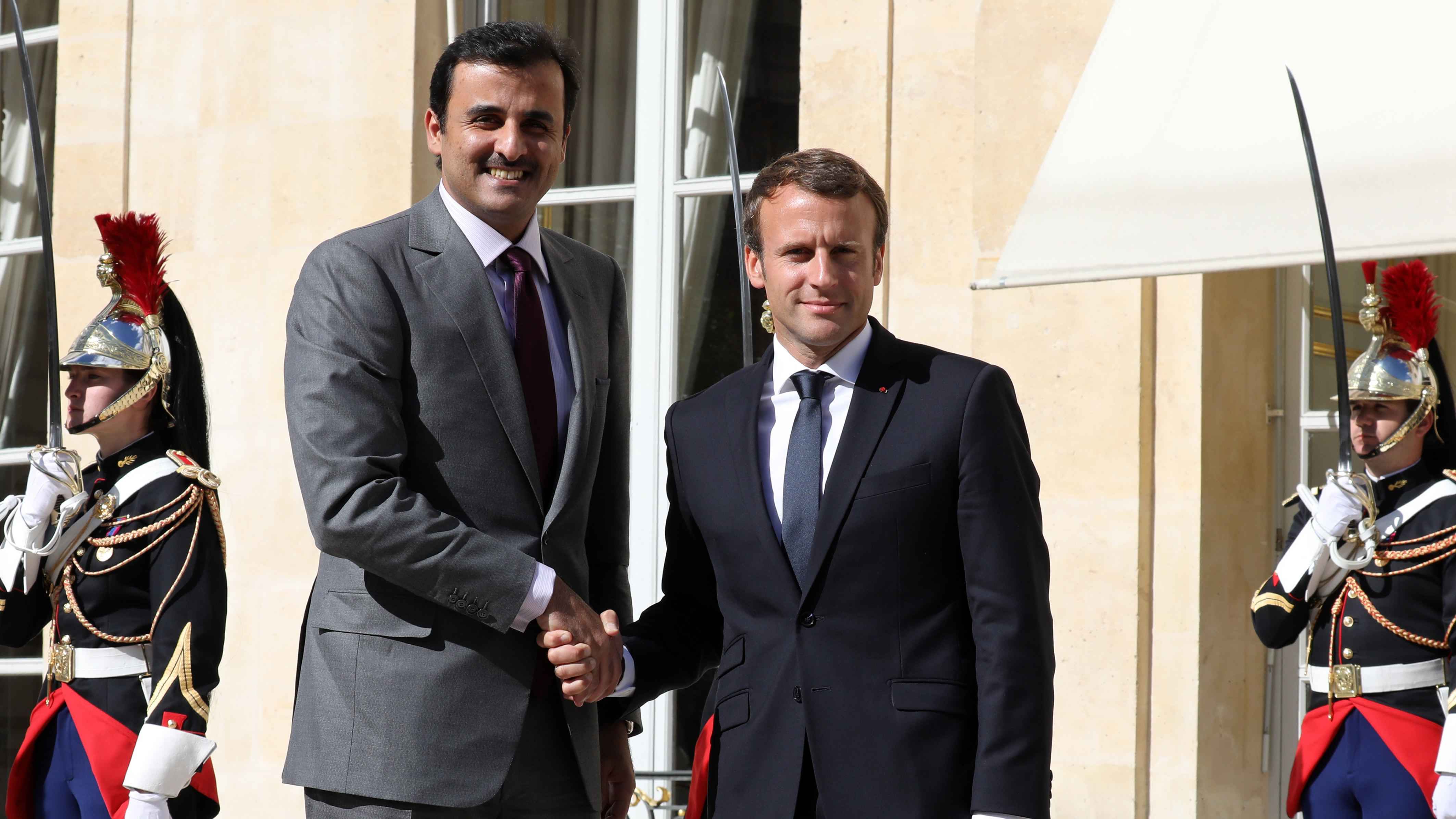
French President Emmanuel Macron shakes hands with Qatar's Emir Sheikh Tamim bin Hamad Al-Thani upon his arrival at the Elysee Palace in Paris on September 15, 2017. /AFP Photo
French President Emmanuel Macron shakes hands with Qatar's Emir Sheikh Tamim bin Hamad Al-Thani upon his arrival at the Elysee Palace in Paris on September 15, 2017. /AFP Photo
French President Emmanuel Macron following his meeting with Sheikh Tamim on Friday urged the lifting of a Saudi-led embargo “affecting the people of Qatar, in particular, families and students… as quickly as possible."
Earlier on Friday, German Chancellor Angela Merkel said at a meeting with the Qatari emir that Doha's crisis with Gulf neighbors will only be resolved through quiet diplomacy.
On Thursday, Turkish President Erdogan hosted the emir at his presidential palace in Ankara. Both leaders emphasized the importance of solving the crisis in the Gulf diplomatically and vowed to further bolster relations between Ankara and Doha.
Food crisis
Last month, the International Monetary Fund (IMF) said that transportation and food costs in Qatar had "edged up" because of the diplomatic rift. An IMF team that visited the capital, Doha said that Qatar’s government was able to soften the immediate impact of trade disruptions, but that some costs had gone up as a result of delays caused by rerouting trade.
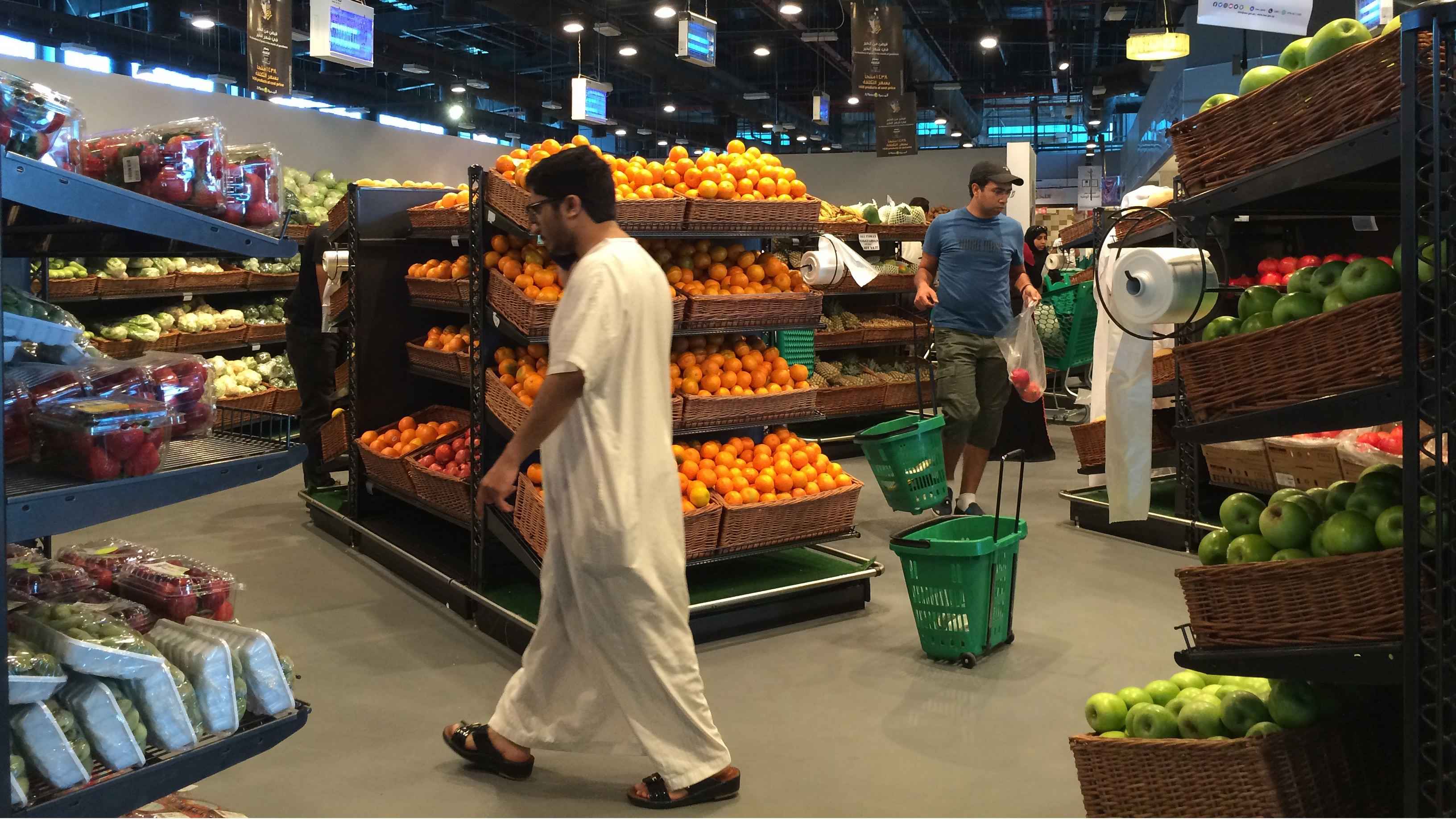
Customers are seen shopping at the Al Meera market in the Qatari capital Doha, on June 10, 2017. /AFP Photo
Customers are seen shopping at the Al Meera market in the Qatari capital Doha, on June 10, 2017. /AFP Photo
The IMF warned the rift could have a wider impact across the Gulf Cooperation Council (GCC), which consists of Qatar, Saudi Arabia, the UAE, Bahrain, Kuwait, and Oman. Because of the sanctions, Qatari food and beverage prices rose 4.2 percent from the previous month in July, their fastest increase in at least several years, government data showed.
The fact that Qatar is dependent on imports for over 90 percent of its supplies meant that food security has always been high on its agenda, much before the ongoing crisis erupted some three months ago.
Before the blockade was imposed on June 5, Qatar imported close to 90 percent of its food through the Abu Samra crossing, on its border with Saudi Arabia. The crisis has compelled Qatar to increasingly restructure its food import routes.
Lately, Qatar has turned to Turkey, Iran, Oman, and India to fill gaps in its food imports and even construction material needed to build infrastructure for FIFA World Cup in 2022. Freight companies from these countries have stepped in to ensure there are no major shortages.
Let’s take a look at the countries that are coming to the aid of Qatar in these trying times:
Turkey emerges as strongest ally
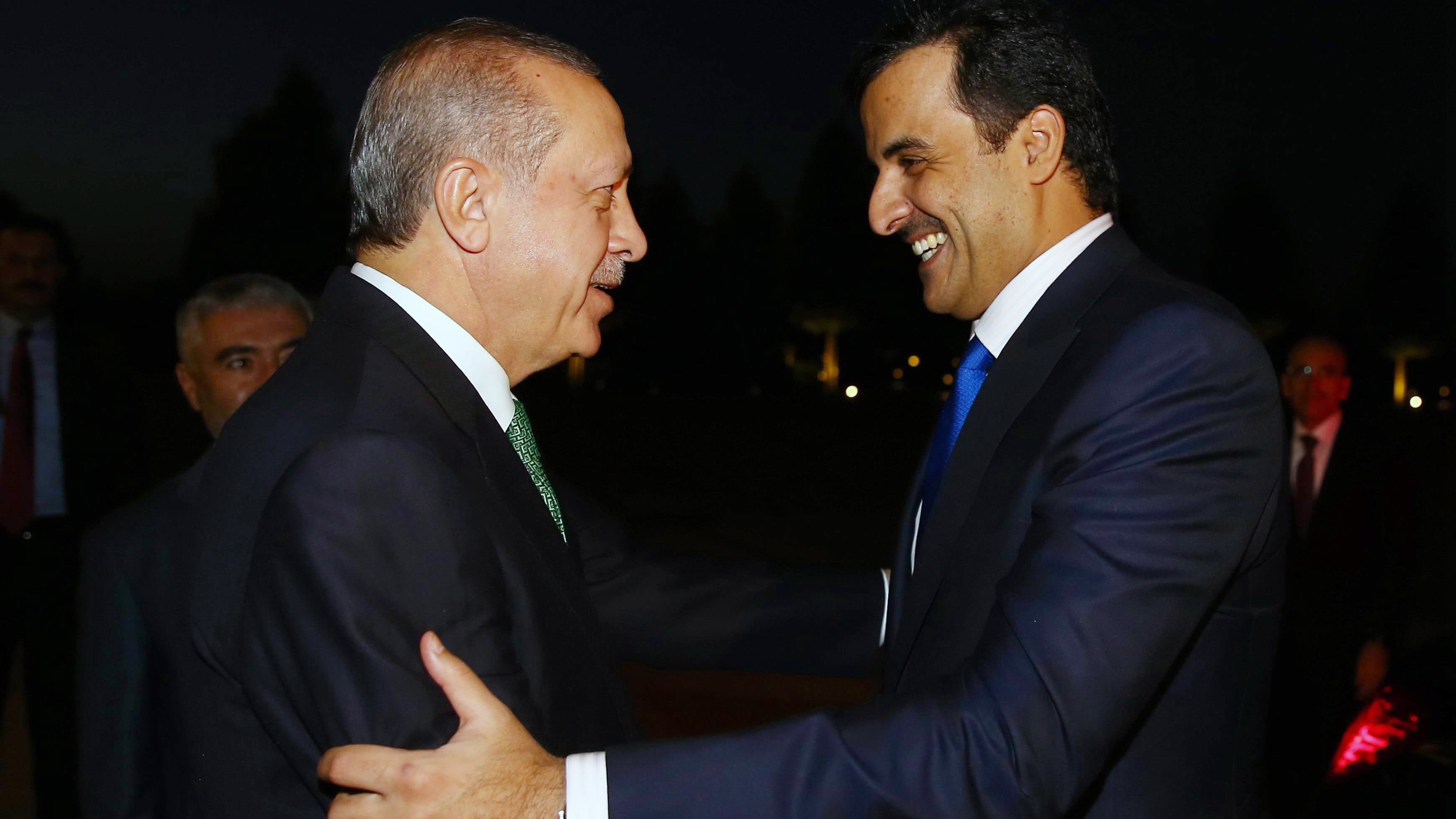
Qatari Emir Sheikh Tamim bin Hamad Al-Thani greets Turkish President Recep Tayyip Erdogan at the Presidential Complex in the Turkish capital Ankara, on September 14, 2017. /AFP Photo
Qatari Emir Sheikh Tamim bin Hamad Al-Thani greets Turkish President Recep Tayyip Erdogan at the Presidential Complex in the Turkish capital Ankara, on September 14, 2017. /AFP Photo
Turkey has emerged as Qatar’s strongest regional ally, dispatching its first ship carrying food aid along with a small contingent of soldiers and armored vehicles within the first 10 days after the Saudi-led blockade was announced. Since then, Ankara has sent over hundreds of planes with food and other products to Qatar.
In early July, Qatar’s Hamad Port welcomed the Green Guatemala refrigerated ship, which carried 3,000 tonnes of miscellaneous foodstuffs including dry food, fruits, and vegetables from the Turkish port of Izmir. In late August, a second Turkish ship loaded with food supplies docked at the Qatari port just days ahead of Eid al Adha to meet the demands during the Muslim festival.
Qatar is also benefiting from the land route from Turkey to Iran’s port of Bushehr, which is connected by sea to Qatar’s Ruwais port. Earlier this month a convoy of 200 trucks carrying milk, fruits, vegetables, grains and other food products from Turkey arrived in Qatar through this route, Doha-based The Peninsula reported quoting a prominent Qatari businessman Ahmed al-Khalaf.
“The land trade route through Turkey, Iran, and Qatar is expected to significantly reduce the cost of transportation of goods. The new trade line will lead to a decline of nearly 80 percent in the transportation cost of food items compared to air freight charges,” the daily said.
The sea route between Turkey and Qatar initially took 11 days, while the land route took 14 days. And recent experiments have reduced this duration to nine days. Turkey aims at reducing the travel time to five or six days or even less. The newly propounded commercial land transport line, from Turkey’s Mardin city to Iran’s Bushehr port, will further shorten the duration to two or three days at the most, the report added.
Iran offers a vital sea link
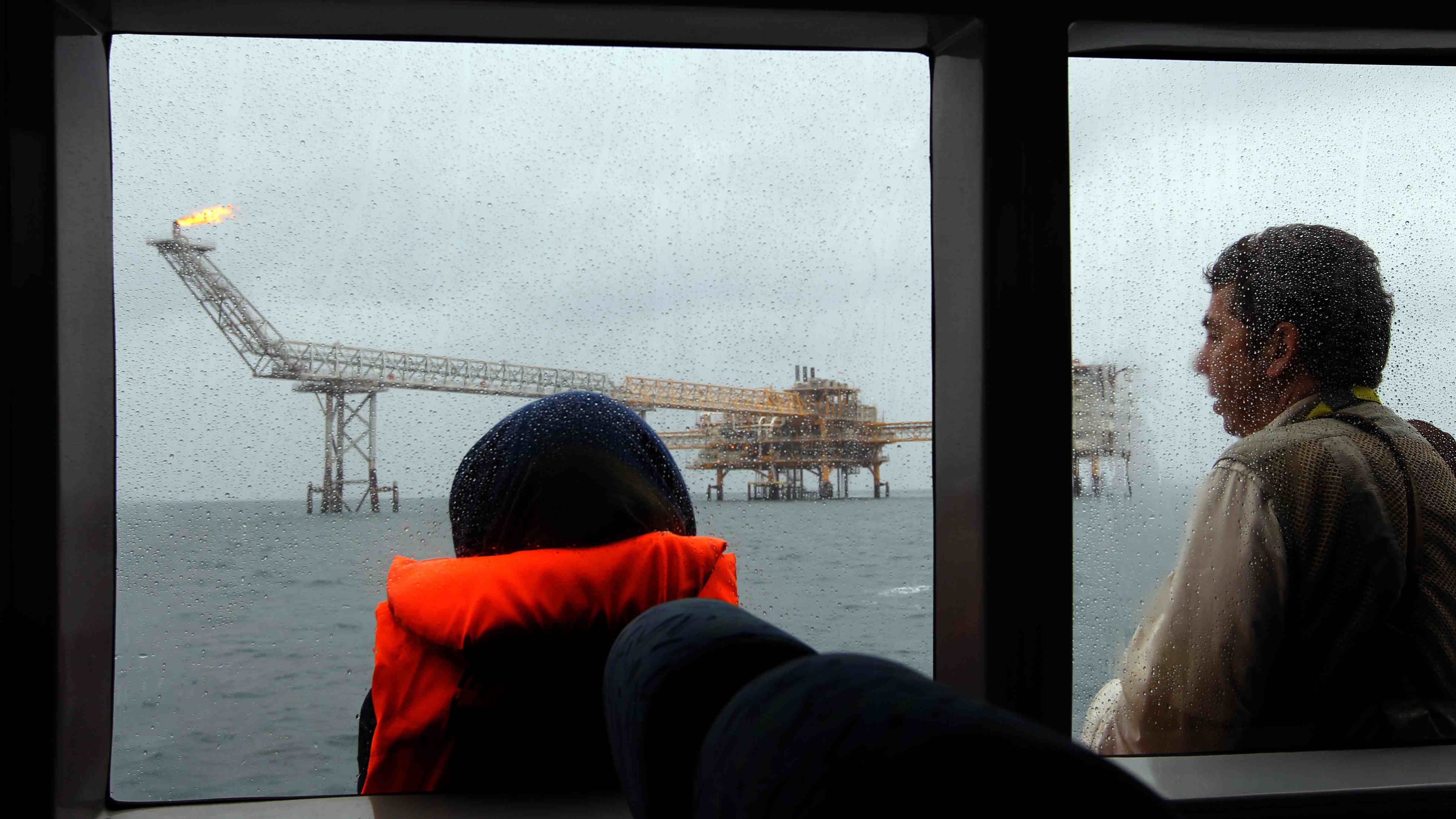
Journalists look at the Iranian South Pars quarter one (SPQ1) gas platform in the Gulf near Qatar's territorial waters on January 26, 2011. /AFP Photo
Journalists look at the Iranian South Pars quarter one (SPQ1) gas platform in the Gulf near Qatar's territorial waters on January 26, 2011. /AFP Photo
Qatar’s ties with Iran has witnessed a thaw following the Saudi-led blockade. Late August, Doha announced the restoration of full diplomatic ties with its neighbor across the Gulf. Iran’s location makes it a natural supply link for Qatar after the closure of its only land border with Saudi Arabia.
The sea link between Iran and Qatar has been vital for its supplies from Turkey. The Bushehr port on the Gulf coastline is located some 148 nautical miles from Qatar offering the fastest maritime supply route between the two countries. It is estimated that around 1,100 tons of food products are being supplied to Qatar from Iran every day, according to Mohammed Mehdi Bonchari, the director of Iran’s Bushehr port.
Tehran began deliveries to Doha shortly after the blockade was imposed, with Iran Air, the national carrier, saying it flew five planeloads of fruits and vegetables to the country on June 11. Since then, Iran has sent several planes, boats and ships loaded with food supplies to Qatar.
Abbas Maroufan, the deputy for domestic trade at the Iranian Government Trading Corporation, famously told the media that Iran could satisfy the food demands of “ten countries like Qatar.”
Oman opens shipping lanes
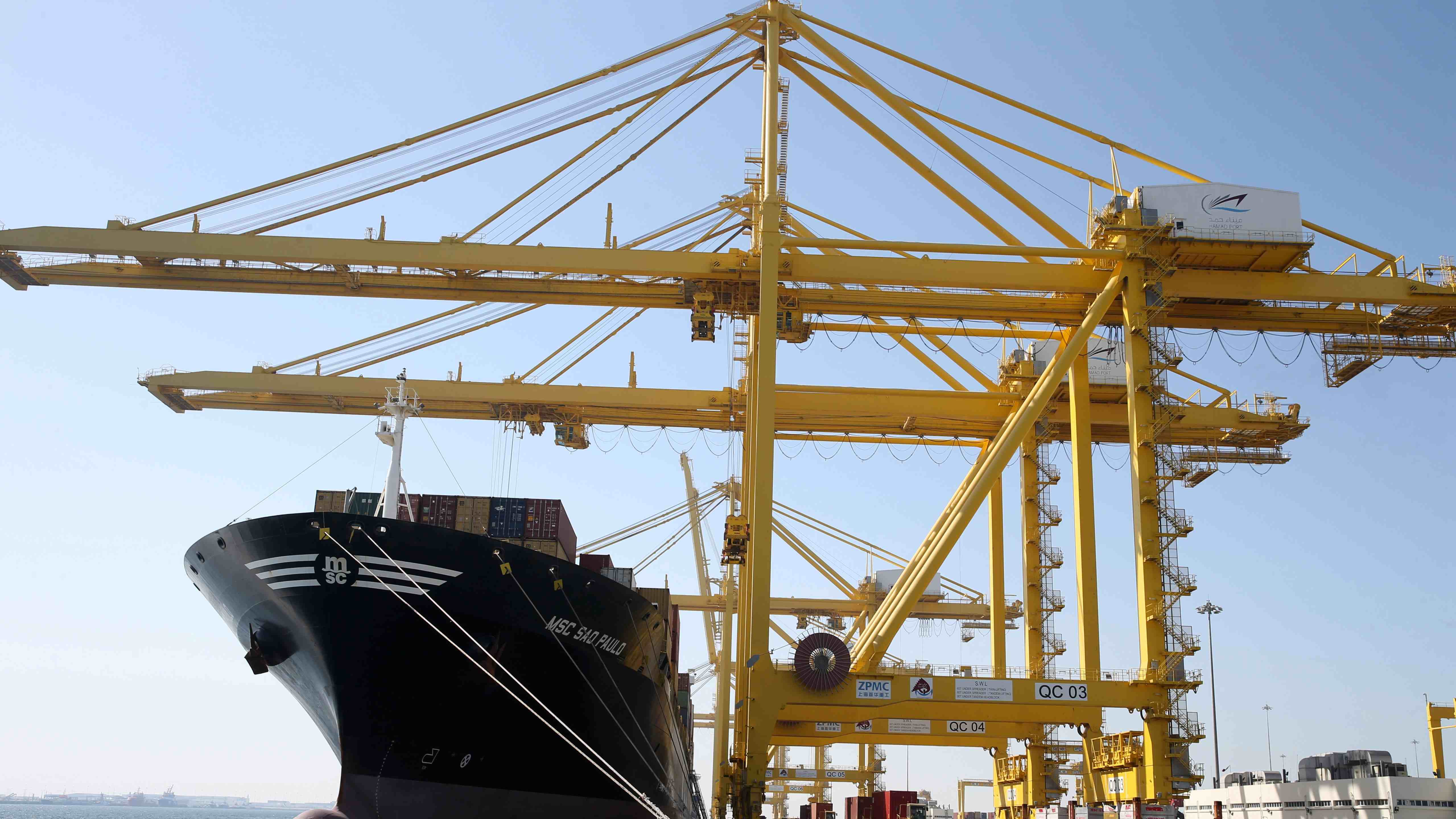
A general view of Qatar's Hamad port in Doha on June 14, 2017. /AFP Photo
A general view of Qatar's Hamad port in Doha on June 14, 2017. /AFP Photo
Oman is perhaps the only GCC member state that has come to Qatar's aid in regard to its food needs. Oman has stayed neutral throughout the recent diplomatic spat between Qatar and the Saudi-led bloc.
Within days of the blockade being imposed, Qatar Ports Management Company (Mwani) opened two new shipping services between Qatar and Oman linking Doha's Hamad port with the ports of Sohar and Salalah in Oman.
The new shipping lanes were vital in breaking the ongoing blockade of Qatar by its regional neighbors.
Major shipping companies, such as Maersk Line, have been since redirecting their marine traffic for Qatar via Oman.
Around 300 containers of fresh and frozen food arrived in Doha from Sohar and Salalah ports with the first few days of the blockade. Since then, these two ports in Oman have been sending regular shipments of foodstuff to Qatar.
India, an important partner
“Although many have noted Turkey, Iran, and Oman’s significant roles in helping Doha meet food security requirements, India too has been an important partner of the Qataris as they restructure their import lines to circumvent the quartet’s blockade,” according to a report jointly authored by Georgio Cafiero, CEO, Gulf State Analytics and Elaine Miao, a contributor to the Washington, DC-based geopolitical risk consulting firm.
India has aided Qatar in several vital ways, the report titled “India’s role in Qatar’s food security crisis” said.
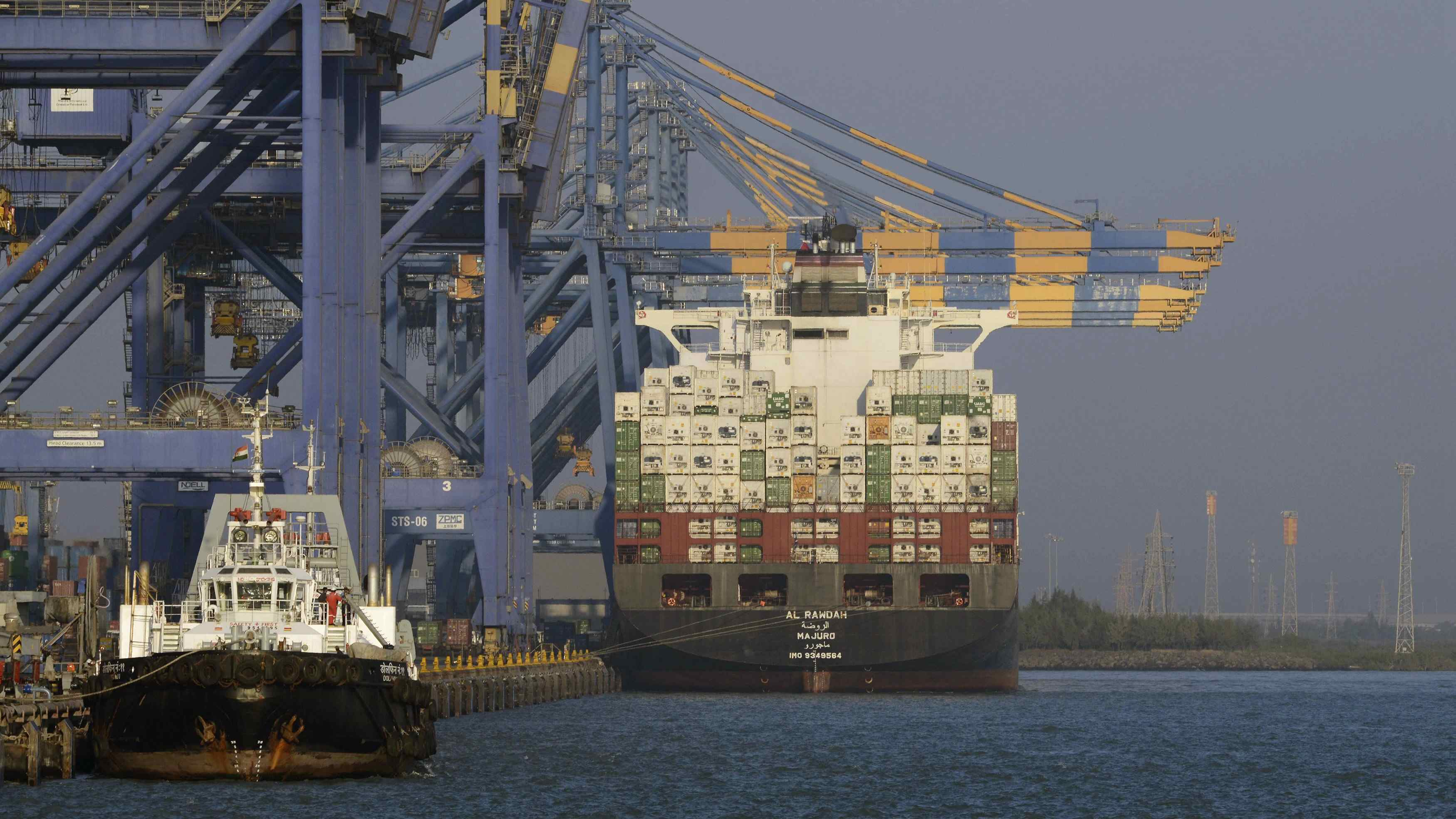
A container ship (R) docked at India's Adani Port Special Economic Zone (APSEZ) in Mundra, on December 21, 2016. /AFP Photo
A container ship (R) docked at India's Adani Port Special Economic Zone (APSEZ) in Mundra, on December 21, 2016. /AFP Photo
“First, the two countries established a close partnership, which has helped Doha deal with the issue of food security amid the ongoing row. For years India has assisted the Gulf country in terms of increasing its growth of livestock and crops. Doha’s goal has been to increase indigenous agricultural production to raise production of its own food from 10 to 70 percent.”
“In fact, in recent years Qatar and India have established joint business and investment ventures, specifically in bolstering Qatar’s agricultural resources. In 2013, Doha invested 500 million US dollars into an Indian food production company, Bush Foods Overseas, to increase food supplies,” the report added.
The report further stated that Qatar has bought farmland in Asia and parts of Kenya as a solution to its own infertile land. These investments, especially with India, have cushioned the Qatari government throughout the past three months.
Additionally, to immediately provide relief for Qatar’s food insecurity, New Delhi has sent food and supplies to Doha through direct shipping routes linking Qatar’s Hamad Port to India’s ports in Mundra and Nhava Sheva (also known as the Jawaharlal Nehru Port).
$440 mln food facility
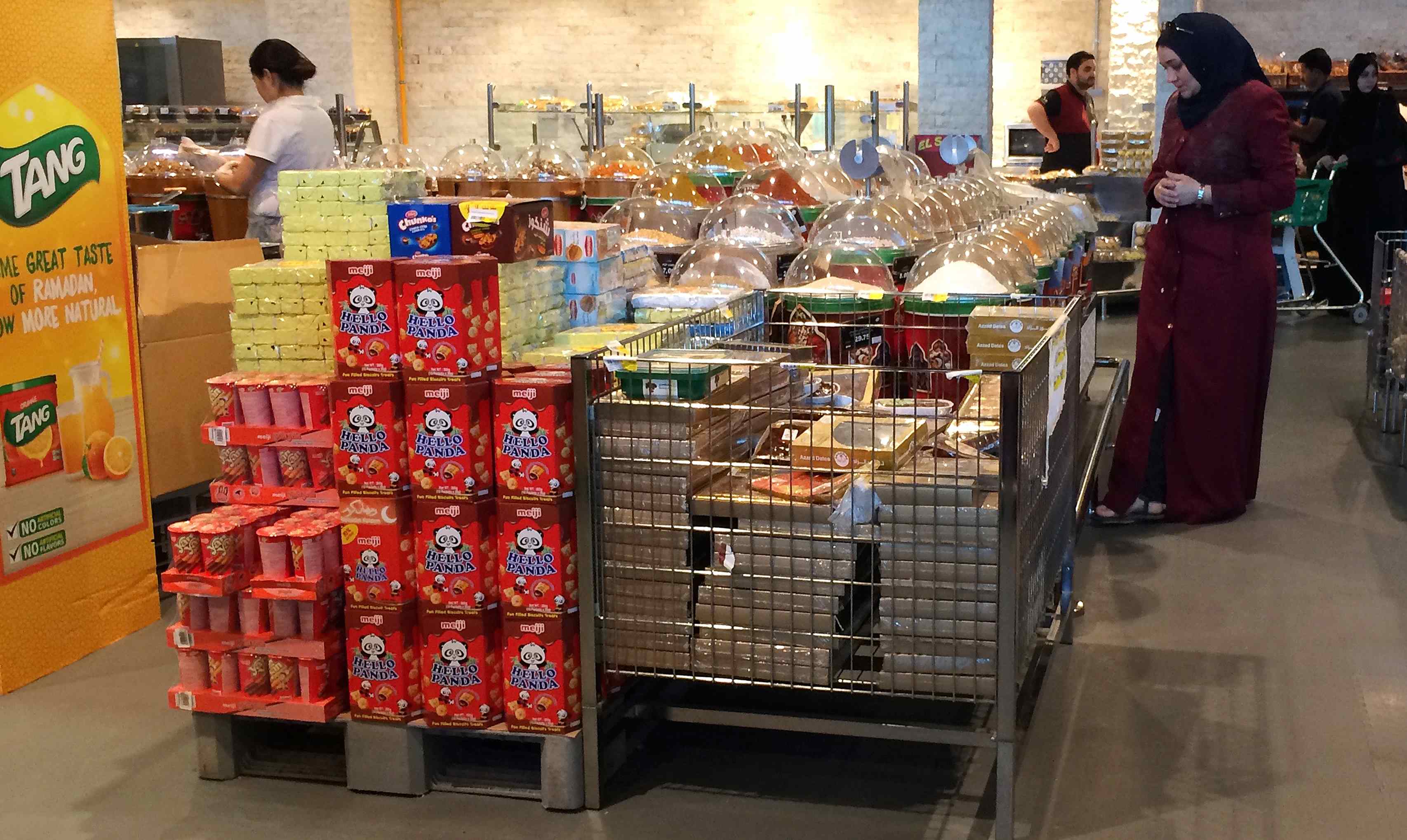
Customers are seen shopping at the Al Meera market in the Qatari capital Doha, on June 10, 2017. /AFP Photo
Customers are seen shopping at the Al Meera market in the Qatari capital Doha, on June 10, 2017. /AFP Photo
Meanwhile, on August 23, Qatar Islamic Bank signed to provide 1.6 billion Qatari riyals (440 million US dollars) of financing to build a food processing and storage facility at the country’s Hamad Port, as Doha strengthens its resistance against sanctions by other Arab states, Reuters reported.
The 530,000 square meter facility, to be built by AlJaber Engineering in about two years, will include equipment to process and refine rice, raw sugar and edible oils, the bank said. It will also feature rice silos, warehouses, and edible oil storage tanks. Some of the food processed by the facility may be exported regionally or globally, and waste products from the facility will be used to create animal feed.
The government-backed project was planned before the Saudi-led blockade but the facility has become more important to Qatar’s food security since the crisis began.
While Qatar has repeatedly stressed that the blockade has failed in disrupting food supply to the country, the diplomatic crisis nevertheless has demonstrated how food security could be used as a political tool in the region.

